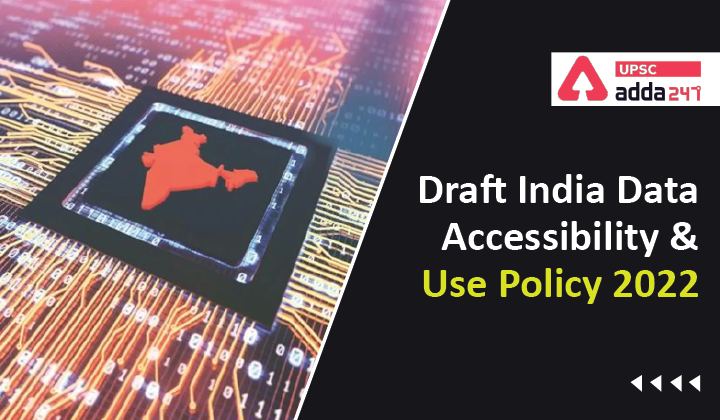Table of Contents
Draft India Data Accessibility and Use Policy 2022: Relevance
- GS 2: Government policies and interventions for development in various sectors and issues arising out of their design and implementation.
India Data Accessibility and Use Policy: Context
- Recently, Ministry of Electronics and IT (MeitY) has published a Draft India Data Accessibility and Use Policy 2022 which says all data collected, generated, and stored by every government ministry and department will be open and shareable barring certain exceptions.
Data Accessibility and Use Policy: Key points of the draft
- India Data Council and India Data Office: The draft proposes that a regulatory authority called the Indian Data Council (IDC) and an agency by the name India Data Office (IDO) will oversee framing metadata standards and enforcement, respectively.
- While the IDC will comprise the IDO and data officers of five government departments, the IDO will be constituted by MeitY to streamline and consolidate data access and sharing public data repositories across the government and other stakeholders.
- IDC responsibilities: IDC will be tasked with defining frameworks for defining high-value datasets, finalising data standards and metadata standards, and reviewing the implementation of the policy.
- Stakeholders like start-ups, other enterprises, individuals and researchers will be able to access enriched data through data licensing, sharing, and valuation within the frameworks of data security and privacy.
- The draft paper said that each central ministry/department will adopt and publish its domain-specific metadata and data standards.
- These standards would be compliant with the interoperability framework, policy on open standards, institutional mechanisms for formulation of domain-specific metadata and other relevant guidelines published on the e-gov standards portal.
Draft data policy India: Issues in the draft
- Experts are of the view that the core objective of this policy seems to be purely revenue generation.
- It lacks clarity on a number of things such as how a high-value dataset will be defined.
- The draft policy doesn’t clearly state how areas of it overlap, like how the consent and anonymisation of an individual’s data that resides with the government will be dealt with.
- The government’s efforts are towards monetisation, which itself follows from the NITI Aayog’s thinking that all non-personal data is national resource. This policy may also see a big pushback from big tech firms as their business models are based on monetising this kind of large-scale data.
Draft data accessibility policy significance
- Stakeholders like start-ups, other enterprises, individuals and researchers will be able to access enriched data through data licensing, sharing, and valuation within the frameworks of data security and privacy.
- A broad set of guidelines would be standardized and provided to help ministries and departments define their data retention policy.
- Maximizing access to and use of quality public sector data
- Improve policymaking, evaluation and monitoring
- Enhancing the efficiency of service delivery
- Facilitating the creation of public digital platforms
- Protecting the privacy and security of all citizens
- Streamlining inter-government data sharing
- Promoting transparency, accountability and ownership in data sharing and release
- Building digital and data capacity, knowledge and competency of government officials
- Promoting data interoperability
- Ensuring greater citizen awareness with open data
- Enabling secure pathways
- Increasing the availability of high-value datasets
- Improving the overall compliance to data sharing policies and standards.
Also Read:





 TSPSC Group 1 Question Paper 2024, Downl...
TSPSC Group 1 Question Paper 2024, Downl...
 TSPSC Group 1 Answer key 2024 Out, Downl...
TSPSC Group 1 Answer key 2024 Out, Downl...
 UPSC Prelims 2024 Question Paper, Downlo...
UPSC Prelims 2024 Question Paper, Downlo...





